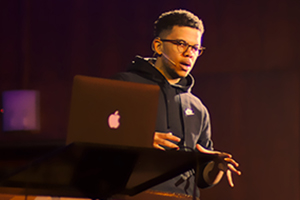
Sizwe Mpofu-Walsh shared with the audience the
creative process of writing a song at the 2017
TEDxUFS conference.
Photo: Voxomnia
“Sometimes it’s the parts of us that give us the most agony, the parts of us that we think we need to change to conform to other people’s expectations, which are actually the gateways which allow us to make an impact in the world.”
This encouragement from Sizwe Mpofu-Walsh was one of the highlights of the 2017 TEDxUFS conference. According to the author, musician, and activist, we should embrace every part of ourselves. We should understand that the way in which each of us can change the world, is by becoming one with all the different parts of us which people think can’t come together.
Audience hears project for first time
For the first time ever, Sizwe shared material from his project Democracy and delusionwith an audience at the 4th annual TEDxUFS conference in the Odeion Theatre at the University of the Free State on 5 August 2017. Other speakers included the likes of Murendeni Mafumo, founder of Gentle Giant, and Elijah Djan, CEO and inventor of Nubrix.
The event also included TEDx videos, breath-taking performances, and cutting-edge technological exhibitions. The theme was Prism of Possibilities.
Launching a book and album together
Sizwe shared how he, while studying at the University of Oxford, embarked on an ambitious project where he combined his passion for academics and music: To release a book and album about the same things at the same time.
The project is a reflection of the political landscape in South Africa. Sizwe showed how he created a song about student protests by putting different layers of music together.
“The only way to do something that will leave you truly remembered is to do something different. It is to take all of yourself and pour it into the creative pursuit that you produce.”